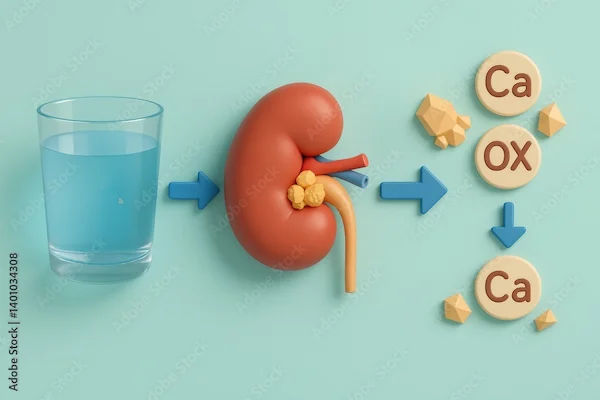How To Reduce Calcium Oxalate In Urine?
Looking to reduce calcium oxalate in your urine? Discover key dietary adjustments and lifestyle changes to help prevent kidney stones and manage oxalate levels.

Written by Dr.Sonia Bhatt
Last updated on 3rd Jul, 2025
.webp?tr=q-80,f-webp,w-350,dpr-2,c-at_max 700w)
Introduction
If you’ve been told that you have high levels of calcium oxalate in your urine, you may be wondering what it means and how to manage it. Calcium oxalate is a common type of kidney stone, and having too much of it in your urine can increase your risk of developing painful stones. The good news is that simple dietary and lifestyle changes can help reduce calcium oxalate levels and protect your kidneys.
In this article, we’ll explain what calcium oxalate is, why it forms, and practical steps you can take to lower it naturally.
What Is Calcium Oxalate?
Calcium oxalate is a compound formed when calcium combines with oxalate (a natural substance found in many foods). Normally, small amounts pass through your urine without causing problems. However, if the concentration becomes too high, these crystals can clump together and form kidney stones.
Symptoms of High Calcium Oxalate in Urine
You may not notice symptoms until kidney stones form. Signs of calcium oxalate stones include:
Sharp pain in the back, side, or lower abdomen
Frequent urination or burning sensation while urinating
Blood in urine (pink, red, or brown urine)
Nausea or vomiting
Cloudy or foulsmelling urine
If you experience these symptoms, consult a doctor immediately.
Causes of High Calcium Oxalate Levels
Several factors can contribute to excess calcium oxalate in urine:
Dietary Oxalate Intake: Consuming a high amount of oxalate-rich foods like spinach, nuts, and chocolate increases oxalate levels in urine.
Low Fluid Intake: Insufficient water consumption leads to more concentrated urine, increasing the risk of calcium oxalate crystal formation.
High Sodium Diet: Excess sodium intake promotes increased calcium excretion in the urine, which can then bind with oxalate.
Low Calcium Intake: Paradoxically, too little dietary calcium can increase oxalate absorption in the gut, leading to higher urinary oxalate.
Digestive Disorders: Conditions affecting fat absorption can lead to increased oxalate absorption and excretion in urine.
Genetic Factors: Some individuals have a genetic predisposition to producing more oxalate.
Consult Top Endocrinologist To Reduce Calcium Oxalate
How to Reduce Calcium Oxalate in Urine
Tips on how to reduce calcium oxalate in urine:
Stay Hydrated: Drink 2.5–3 liters of water daily to dilute urine and prevent crystal formation.
Balance Your Calcium Intake: Consume adequate dietary calcium (1000–1200 mg/day) and pair calcium-rich foods with oxalate-rich meals, avoiding unnecessary supplements.
Limit High-Oxalate Foods: Reduce intake of spinach, beet greens, nuts, chocolate, and other high-oxalate items.
Cut Back on Sodium: Limit processed foods and salty snacks to reduce calcium excretion in urine.
Increase Citrate-Rich Foods: Include lemons, limes, oranges, and low-fat dairy to help prevent stone formation.
Moderate Animal Protein: Limit meat, poultry, and seafood intake to control uric acid and calcium levels in urine.
Maintain a Healthy Weight: Achieve and maintain a healthy weight through diet and exercise to reduce kidney stone risk.
Check Vitamin C Supplements: Avoid high doses of vitamin C supplements, opting for food sources instead.
Monitor Sugar & Fructose Intake: Reduce sugary drinks and high-fructose corn syrup to minimize calcium excretion.
When to See a Doctor
If you frequently develop kidney stones or have persistent symptoms, consult a urologist. They may recommend:
24hour urine test to measure oxalate, calcium, and other minerals.
Medications (like potassium citrate) to reduce stone formation.
Specialized diet plans tailored to your needs.
Book a Consultation with Apollo 24|7
If you're concerned about calcium oxalate levels or kidney stones, Apollo 24|7 offers expert consultations and diagnostic tests. You can easily schedule a urine test or speak to a nephrologist from the comfort of your home.
Conclusion
Reducing calcium oxalate in urine is largely about smart dietary choices and staying hydrated. By drinking enough water, balancing calcium intake, and limiting high oxalate foods, you can lower your risk of kidney stones. Small, consistent changes make a big difference in keeping your kidneys healthy!
Consult Top Endocrinologist
Consult Top Endocrinologist To Reduce Calcium Oxalate

Dr G Prathyusha
General Physician/ Internal Medicine Specialist
5 Years • MBBS DNB (Family medicine), CCEBDM (Diabetology), PGDGM (Geriatrics), Primary care Rheumatologist.
Bengaluru
PRESTIGE SHANTHINIKETAN - SOCIETY CLINIC, Bengaluru

Dr. Nanda N
Endocrinologist
11 Years • MBBS, MD (Paediatrics) (Gold medallist), DrNB (Endocrinology & metabolism), PDCC (Paediatric Endocrinology) (AIIMS)
Bengaluru
Apollo Medical Center, Marathahalli, Bengaluru

Dr. B Rachana
General Physician/ Internal Medicine Specialist
8 Years • MBBS, Fellowship in Diabetes, Fellowship in Applied Nutrition,CCEBDM(Diabetes)
Bengaluru
Apollo Clinic, JP nagar, Bengaluru

Dr Venkata Naga Sai Tribhushan Rambhatla
General Physician
3 Years • MBBS
Bengaluru
PRESTIGE SHANTHINIKETAN - SOCIETY CLINIC, Bengaluru
Dr Sumanth R
General Physician
2 Years • MBBS
Bengaluru
PRESTIGE SHANTHINIKETAN - SOCIETY CLINIC, Bengaluru
Consult Top Endocrinologist

Dr G Prathyusha
General Physician/ Internal Medicine Specialist
5 Years • MBBS DNB (Family medicine), CCEBDM (Diabetology), PGDGM (Geriatrics), Primary care Rheumatologist.
Bengaluru
PRESTIGE SHANTHINIKETAN - SOCIETY CLINIC, Bengaluru

Dr. Nanda N
Endocrinologist
11 Years • MBBS, MD (Paediatrics) (Gold medallist), DrNB (Endocrinology & metabolism), PDCC (Paediatric Endocrinology) (AIIMS)
Bengaluru
Apollo Medical Center, Marathahalli, Bengaluru

Dr. B Rachana
General Physician/ Internal Medicine Specialist
8 Years • MBBS, Fellowship in Diabetes, Fellowship in Applied Nutrition,CCEBDM(Diabetes)
Bengaluru
Apollo Clinic, JP nagar, Bengaluru

Dr Venkata Naga Sai Tribhushan Rambhatla
General Physician
3 Years • MBBS
Bengaluru
PRESTIGE SHANTHINIKETAN - SOCIETY CLINIC, Bengaluru
Dr Sumanth R
General Physician
2 Years • MBBS
Bengaluru
PRESTIGE SHANTHINIKETAN - SOCIETY CLINIC, Bengaluru
